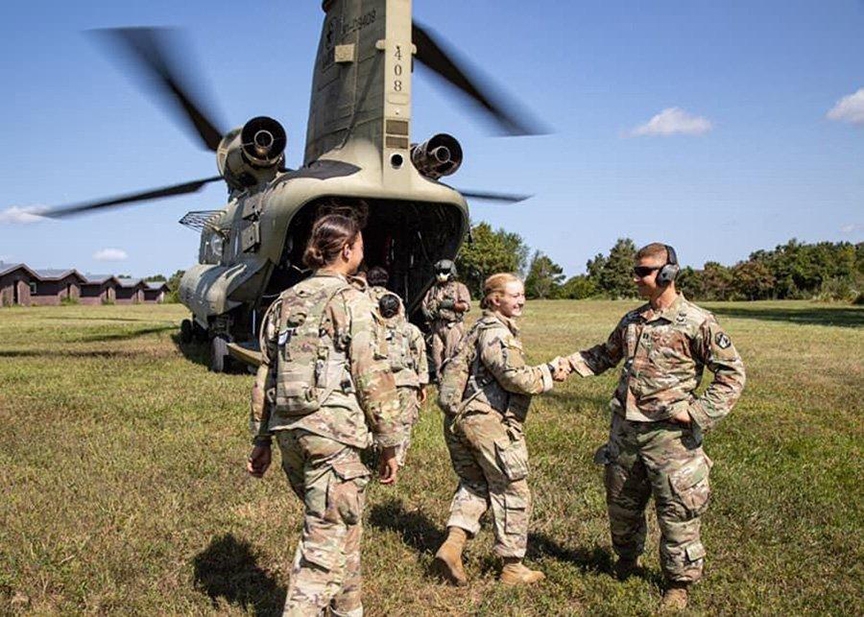
PROVIDENCE, R.I. As much as Father Lukasz J. Willenberg misses being part of a regular parish family back home in the Diocese of Providence, ministering to members of the U.S. Army as a military chaplain for the past eight years has brought him an unparalleled level of joy.
A former assistant pastor at St. Luke Church in Barrington, Rhode Island, Father Luke, as he is affectionately known, was nearly five years into his priesthood when, in 2013, Providence Bishop Thomas J. Tobin granted him permission to serve as a chaplain with the U.S. Archdiocese of the Military Services.
The priest wanted to serve his newly adopted country while continuing to serve as an incardinated priest of the Diocese of Providence.
A competitive triathlete, the native of Dzialdowo, Poland, was well-prepared physically to enter the military world, where he quickly found that the opportunity to speak acronym-filled language, wear the same uniform, and share the same risks as his fellow brave warriors was “humbling and rewarding.”
“Our service members and their families have a spirit of selfless service and a willingness to sacrifice for a cause bigger than themselves and that is noble and worthy of respect,” Father Luke told Rhode Island Catholic, Providence’s diocesan newspaper.
He made the comments in a recent interview as he was settling in and unpacking for yet another new assignment.
This posting has brought Father Luke to Fort Campbell, Kentucky, where he will minister at the field grade level to Green Berets. The priest was promoted to the rank of major Oct. 1.
This is his second stint with the Special Forces community, known for being the most experienced and most skilled “quiet professionals.”
Such chaplaincy assignments require the best the Army has to offer in terms of spiritual resiliency, physical fitness, mental toughness, technical proficiency, and moral character.
His previous assignment was at Fort Leonard Wood, Missouri, where for 14 months Father Luke was a chaplain in the Basic Combat Training unit, welcoming 600 new recruits each week for a 10-week cycle of training, shaping the future of the Army.
“It was such a great opportunity to be there for these ‘kids,’ serving them, hopefully enriching their lives, and bringing them the sacraments on daily basis,” he said.
The best part of the assignment for him was the celebration of one Sunday Mass that attracted more than 1,300 trainees. He felt blessed to have the opportunity to share the Eucharist with so many faithful at once.
He had looked forward to that Mass for a whole week in anticipation of the chance to bring Christ to so many who expressed feeling “tired and burdensome” as they ran through their drills.
Father Luke has served the spiritual needs of his fellow troops in several precarious situations, including his posting to forward operating bases in Afghanistan.
In 2014, the triathlete organized that restive nation’s first officially sanctioned Boston Marathon Afghanistan, a year after completing the stateside race himself.
“I think I have God on my side,” Father Luke joked in a 2014 telephone call with Rhode Island Catholic from Bagram Air Base in Afghanistan, where he finished the race in 2 hours, 44 minutes and 59 seconds – about 11 minutes faster than his 2013 finish in the Boston Marathon.
In 2016, Father Luke broke the record for completing the fastest 12-mile march by any soldier to graduate from the U.S. Army’s elite DeGlopper Air Assault School in Fort Bragg, North Carolina.
At the time the priest was 2nd Battalion chaplain of the 3rd Brigade, 82nd Airborne Division’s 505th Parachute Infantry Regiment. He broke the long-standing record for the march by a full seven minutes, finishing the predawn trek in one hour and 42 minutes.
The foot march served as the final endurance test in a grueling, 10-day training course in which only 65 of the more than 100 soldiers in the class graduated the “Go” or “No Go” system.
As part of the course, soldiers were subjected to everything from time-competitive rappelling – including a 90-foot “Hollywood Rappel” out of a hovering UH-60A Blackhawk helicopter – to employing the skills needed to order a 9-line MEDEVAC (“9” stands for nine types of information transmitted in the call) or to order call-in air support.
The march was the capstone of training known as “the 10 hardest days in the Army.”
As much as these physical exploits and others showcase the speed, strength, and teamwork through which the U.S. military defends the nation’s freedom, the members and their families also rely upon military chaplains to help them strengthen their spiritual lives as well.
The U.S. Archdiocese for the Military Services is entrusted with the pastoral care of 1.8 million Catholics in the United States and around the world, including men and women serving in the U.S. Army, Navy, Air Force, Marines, Space Force, and Coast Guard, along with their families; patients in Veterans Affairs Medical Centers; and U.S. government employees and their families outside the country.
Father Luke, 41, said it is definitely “a calling within a calling,” for him to serve the spiritual needs of the service members and their families.
“It’s a gift that I don’t deserve and never will, but a gift for which I am grateful every single day,” he said. “I have been prayerfully reflecting on the generosity of our loving God who called me to priesthood, his grace and his divine providence that led me to share my priesthood as an Army chaplain.”









